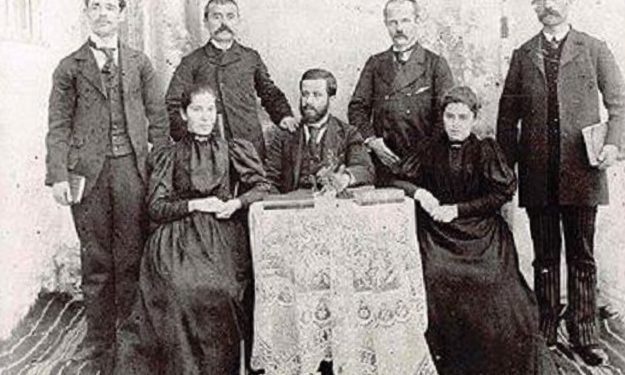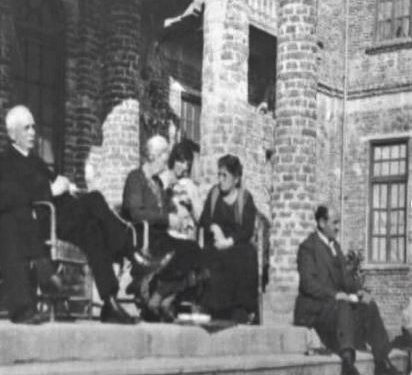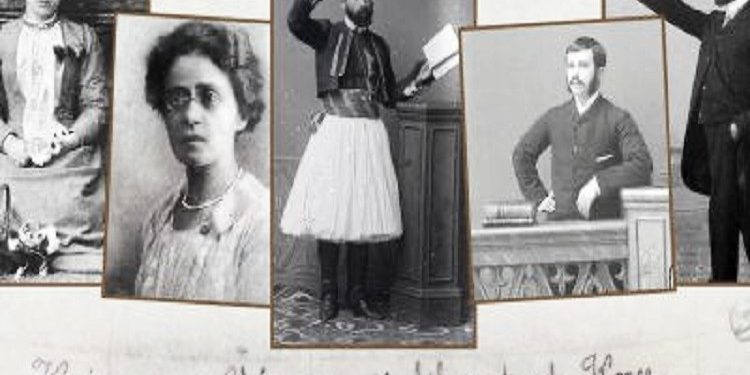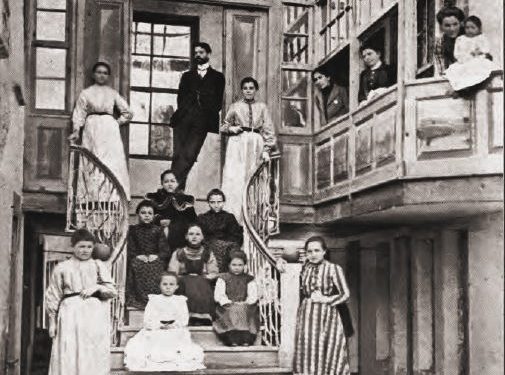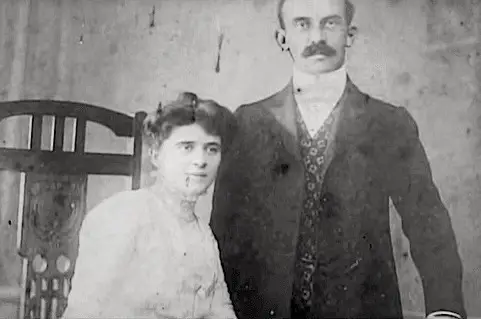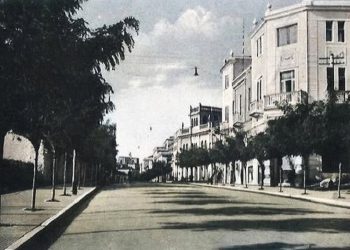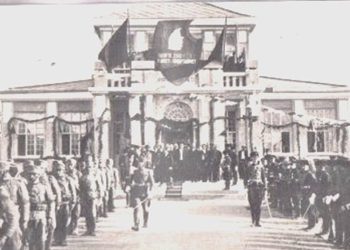From Zija Basha
Memorie.al / Istanbul, July 1891. Morning with a cool breeze coming from the nearby Bosphorus. A group of girls came down the stairs of the Robert College dormitory, dressed in black aprons and white collars, down a narrow alley paved with black cobblestones. On both sides of the alley, multi-colored roses adorned the little paradise that these girls cared for as they walked as smoothly as butterflies towards their imposing school building. The Latin letters “ROBERT COLLEGE” were clearly visible. They talked in a low voice and sometimes hugged each other. The college administration organized a farewell meeting with these students, who graduated from this American college, and were to be dispersed to their countries.
Among them stood out a girl with an average body, a smiling face, a nose like a candle, glasses and a smile, with hair arranged behind her head like a bun. Every now and then he would quicken his steps in front of his friends like a partridge, and then he would stop, turning his face to his friends and smiling like that, looking like a mountain toad. His face was shining from the July sun rising above the blue sky and with that appearance, he looked like a fairy descended from God’s heaven. She was not wearing a bracelet, nor a gold or silver pendant, just two small earrings with blue ruby stones, like all her friends. It was the Albanian Sevasti Qiriazi.
The girls approached the school and the emotions increased. The director of the college and the lecturers had gone out into the yard and were talking quietly to each other. The girls could read the sorrow of separation on their faces and began to cry. They would be separated forever from those beloved educators, who fought side by side for four years, in the difficult struggle of knowledge, and would go to distant parts of the empire, never to see each other again. But Director Eliot Spencer, seeing everyone’s despair and overcoming it, said with a smile:
– “Come closer to hug them doves” because you have honored us and we therefore love you very much. The girls and the teaching staff became one and embraced as children embrace their loving parents. Together, they entered the large theater performance hall, which had been prepared for the party by the college administration. The deputy director, Anna Triks, stepped onto the stage of the red silk curtained theater, lit by the chandeliers on either side. With emotion he addressed all the participants with these words: – “Dear girls! Dear colleagues! I’m very excited, I’ll talk to you from the bottom of my heart. I left the speech in my bag, because it seemed dry with the words, I chose for you. You deserve much more respect and gratitude from students and teachers. Happy as you my daughter, that you all successfully finished college and honored us, your families and your countries. Happy as we are for you, dear students. We, your lecturers, feel proud that our work with you achieved this victory as a blessing from God. We unanimously wish your health and success in your countries for the spread of knowledge.
You are already free to do whatever you like because you have the intelligence to hear, the judgment to discern, the soul to feel, the conscience to weigh everything. You already know that all evil is forbidden. Vices and unjust actions, unfaithfulness, cunning is of the dirty world. Do not approach them. Remove them from you and your families and cleanse the society of your nations from them. Be a missionary now. God be with you”!
Endless emotions for everyone. Our Sevastia looked vaguely at the English language teacher, who was going down the steps of the stage, because her eyes were full of tears. The cocktail continued for about two hours and director Spencer said that; at 6 o’clock in the afternoon, the graduation ceremony would take place in that hall.
Sevastia was released from the dormitory and went to the train station. He decided to meet at the Ministry of Education, Naim Beun. Waited a little at the station, until uncle Jashari’s letter arrived from Erindi Gjirokastra. Only with him she went to visit Naim Beu’s house. He got into the phaeton and asked uncle Jashari to take him down to the Ministry of Education, to meet Naim Beu, near Topkapi-sarai. Walk along the road by the sea, until near the Sultan Ahmet and she Sofia mosque.
There the road is blocked. Uncle Jashari told him that; Sultan Hamidi II visited the grave of his mother Tirimuje. Her tomb from phaeton looked like a large porcelain jam vase, with several different horizontal lines. Uncle Jashari said to her: – “My dear daughter. These kings and viziers, when they rise to the top, seem to them themselves big and the world small. The poor steal and kill, but when the end comes, death, they become believers. Yes, it is too late since then, the people will lose their trace. You will live and remember me”.
Uncle Jashari changed direction and in a second alley, reached the Ministry of Education. He waited until Naim Bey came out in the yard full of flowers and decorative trees and left to come back after an hour there.
How she longed to meet her mentor, Naim Beu, went to a cafe nearby and started a hearty conversation, like father and daughter. How he thanked Naim, for everything he had done for admission to that college and, for the special care, over the years for Sevastia, he invited him to participate in the graduation ceremony as a parent. But Naimi, as he thanked her, gave the happy news that he would come there as a guest, to the representative of the Ministry of Education.
Sevastia informed him that together with her brother, Gjerasim, they had decided to open the “Girls’ School” in Korça. Enthusiastic Naimi said to her: “Sister, you cannot do a better and better job for poor Albania than what you decided to do together with your brother, for the emancipation of the women of our desert country. Your duties now they begin and if you are loyal, persistent and willing you will manage to do great things for the nation. (Sevasti Qiriazi, memories of Naim Beu)
Sevastia told Naim that she really wanted to visit the great Koto Hoxha in prison. Thinking about her young age, Naimi told her: – “This shows that you are a jewel for the nation, but we have to think about it.”
– “I thought about it long and hard all this time, Naim Bey! I will dress as a boy and go.”
– “God bless you, my daughter! To go, to go…”!
After an hour of pleasant meeting with Naim, Sevastia went back to the dormitory with Uncle Jashari’s friend. At the appointed hour for the distribution of diplomas, Naim Bey arrived on time. Sevastia was happy to see him and her heart was beating fast. She was lucky enough to receive her diploma from that blessed hand that guided the pen that wrote those thousands of verses in the sweet Albanian language, and she would be proud of her whole life, in the service of the nation.
After the graduation ceremony, she went to Naim’s house where she would spend a dinner, as in her own house, which she remembered all her life. The next day she went to her friends and teachers, where she finally left to continue her mission as an Albanian education missionary.
How Naimi secured permission from the prison director (an Albanian from Kosovo) and received his guarantee, the Albanian Sevasti Qiriazi, went to the Jedi-Kule prison of four basements. He was dressed as a boy and had the party on his head, which covered all his hair. Yes, how did our heroine find the immortal martyr Koto Hoxhi: “A dirty hole. A streak of light from a path above helped me to distinguish a poor figure. Sadly, I could not think that he was human. A slab of the stone that served as a bed, and a pile of rags where he was sitting. This was Koto! His entire intellectual figure was extinguished. I asked myself: Is it possible that in that misery and coldness of the body Koto’s soul lives, of the great Albanian guide?
“-Life is like you Koto”! I finally got up the courage to mumble. In pain, but with strength, I heard his voice that he asked:
‘Who is he talking to me?! He may be a voice from heaven, sent by God, to speak some words to my wounded heart’! He had a wretched face that touched me so that hot streams ran down my chin. His hair was long. His long beard reached down to his middle. His clothes were only rags. I spoke to him in an almost muffled voice:
– I came, dear father, to bring you the word of courage and to tell you that even though they threw you to suffer this cruel punishment, the seed you planted is bearing good fruit. Your spirit lives in the heart of your people’. The ragged figure answers: Yes! They have chained my body, but my soul is free. He is free and there is no torture that can prevent me from screaming. No! Albania will not be destroyed! She will be united, independent and happy. “Koto – the Sultan told me; don’t you know that your head is in my hand”
– Yes, Your Majesty, my head is in Your Majesty’s hands, but my soul belongs to God, but the honor is mine. – you and me. How did you come and find me here, my flower of Albania, my annual dove! With strength and hope. You made me very happy, morning star that brings light. He sat down and said the verses:
‘O you boys, you will remember me when freedom awakens!
What should I do, poor me, that my eyes are dark’!
I lost my eyes in this cellar, my angel, and my mind is in Albania, in Lunxëria, from Labova e Kryqi to Lekël’.
I parted with tears and despair from that martyr of the nation, with an oath in my heart that I, too, as long as I had my breath alive, would melt my life for Albania”
“Teacher of the People”, Thoma Papapano, insisted that; for this historic meeting of the “Teacher of the People”, Sevasti Qiriazi with the “Teacher of the People”, Koto Hoxhi, the following song goes:
“My dog’s head, my dog’s,
Why not for yourself?
Why didn’t you get scared from the basement?
Night cellar and day cellar.
The lamp spoiled my eyes.
What news have you brought me, my year?
“I opened the cellar, got up and ran away”!
Those happy, but also sad days, Sevastia returns to Albania and in the fall of that year, she implements the promise she gave to Koto Hoxhi and Naim Frasher, to open a school for Albanian girls in Korça, with her brother Gjerasim and late, with her sister Parashqevi Qiriazi.
She designed and published an Albanian grammar for girls. She took part in 1908, in the first and second Congress of Manastir, for the Albanian alphabet with her sister Parashqevine and brother Gjergj Qiriazin, in the congress of Elbasan, when the “Normal” school was founded, with director Luigj Gurakuqin, in 1909 the
Then, that same year, she went to America with her husband, the journalist and writer Kristo Dako and her sister Parashqevi. There he opened a school for “Vatre” branches with ethnic activists to teach Albanians who flocked there as economic immigrants, especially after Albanian Independence.
Kristo Dakua became active in the “Vatra” society, for a while he became its chairman, he published patriotic articles in the “Dielli” newspaper. Sevastia and Parashjevina formed the newspaper (two-weekly) “Ylli Mengjezit” and organized the organization of Albanian women, to be emancipated and educated in the schools of “Vatre” branches.
Kristo Dakua founded the Albanian Political Party, with 5,000 members, which lobbied for Albanian rights, because at the Paris conference, the homeland was at risk of further fragmentation. His words, in the Commemoration sent to the American President Wilson, on May 4, 1919: “How long can a man live without lungs, how long can Albania live without Vlora”! Parashkevia was the only Albanian woman at the Paris Conference.
In 1920, Sevastia and his family returned to Albania and continued the work for the development of national education, establishing the “Qiriazi” institute in Kamez. The patriot Kristo Dako died in 1941. They helped the war as a family. The two Qiriazi sisters were captured by the Germans and sent to the Nazi camp in Denjina, Belgrade, but with the arrival of the Soviets, they were released and returned to Kamez. In 1946, the grave of Kristo Dako was destroyed and the remains of that great patriot were scattered in the mud of the field.
The Qiriazi sisters were arrested, but they were quickly released, to keep two sons of Sevastisa in prison, one died in prison a few months after the arrest, while the little one died in 1949 in prison, saying that he killed himself. A few days later, before her little son died, Sevastia closed her eyes, like Jesus Christ in Golgotha.
She died spiritually martyred, but has remained in the hearts of her people, just as she said to the martyr Koto Hoxhi. With hypocrisy, the communist regime of Enver Hoxha decorated the martyr with the title: “Teacher of the People”, in 1961, but she did not need it, because she had it even without taking it, and she deserved a lot of respect from every Albanian. that makes the Albanian blood boil. Memorie.al




